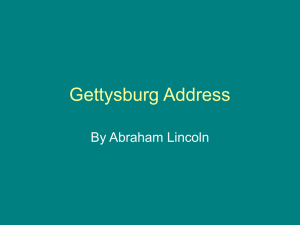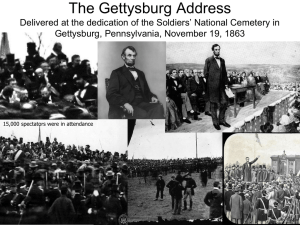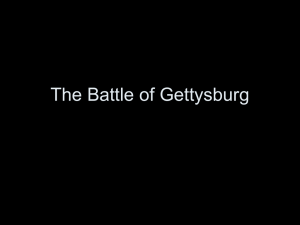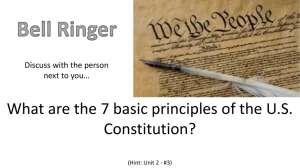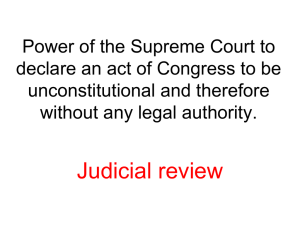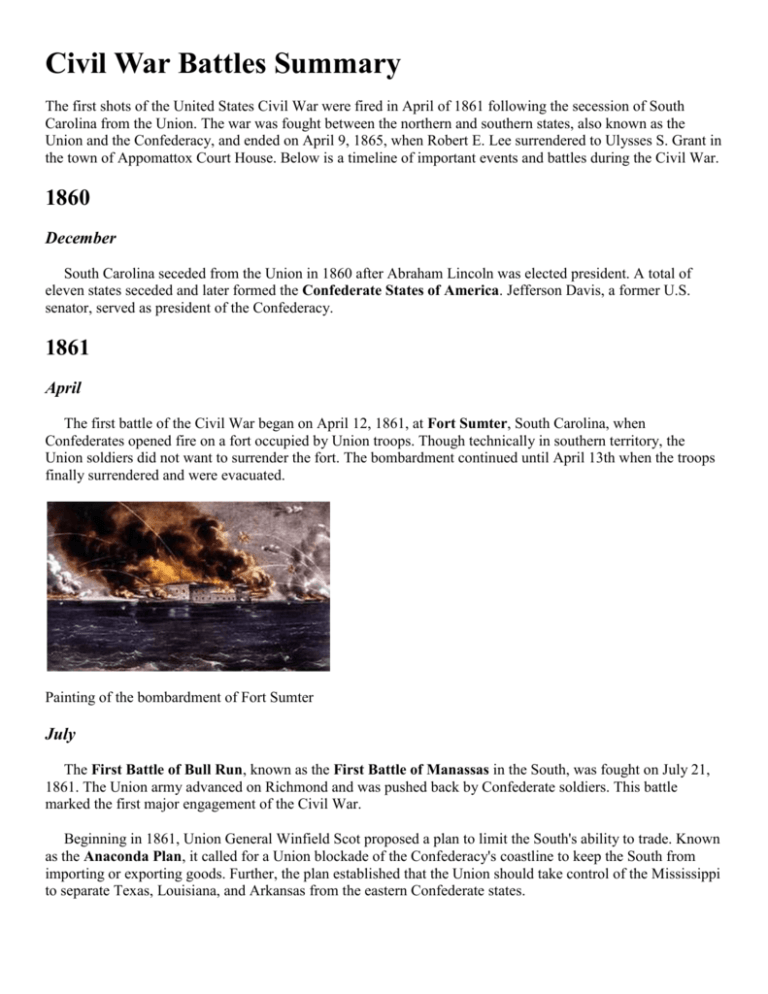
Civil War Battles Summary
The first shots of the United States Civil War were fired in April of 1861 following the secession of South
Carolina from the Union. The war was fought between the northern and southern states, also known as the
Union and the Confederacy, and ended on April 9, 1865, when Robert E. Lee surrendered to Ulysses S. Grant in
the town of Appomattox Court House. Below is a timeline of important events and battles during the Civil War.
1860
December
South Carolina seceded from the Union in 1860 after Abraham Lincoln was elected president. A total of
eleven states seceded and later formed the Confederate States of America. Jefferson Davis, a former U.S.
senator, served as president of the Confederacy.
1861
April
The first battle of the Civil War began on April 12, 1861, at Fort Sumter, South Carolina, when
Confederates opened fire on a fort occupied by Union troops. Though technically in southern territory, the
Union soldiers did not want to surrender the fort. The bombardment continued until April 13th when the troops
finally surrendered and were evacuated.
Painting of the bombardment of Fort Sumter
July
The First Battle of Bull Run, known as the First Battle of Manassas in the South, was fought on July 21,
1861. The Union army advanced on Richmond and was pushed back by Confederate soldiers. This battle
marked the first major engagement of the Civil War.
Beginning in 1861, Union General Winfield Scot proposed a plan to limit the South's ability to trade. Known
as the Anaconda Plan, it called for a Union blockade of the Confederacy's coastline to keep the South from
importing or exporting goods. Further, the plan established that the Union should take control of the Mississippi
to separate Texas, Louisiana, and Arkansas from the eastern Confederate states.
Political cartoon of the Anaconda Plan
1862
March
The Battle of Hampton Roads, also called the Battle of the Monitor and Merrimack, was fought on March
8-9, 1862. Union ship USS Monitor and Confederate ship CSS Virginia, previously named USS Merrimack,
battled at Hampton Roads near the Chesapeake Bay. This battle was the first time ironclad ships had met in
battle, a major development in the history of naval warfare.
Painting of the Battle of Hampton Roads between the Monitor and the Virginia
August
The Second Battle of Bull Run, or the Second Battle of Manassas, was fought from August 28 until
August 30, 1862. During the battle, Union forces were once again defeated at Bull Run. Confederate General
Robert E. Lee led the Confederate troops, who outnumbered the Union soldiers. Union forces were driven out
of the northern part of Virginia because of this battle.
September
The Battle of Antietam took place near Antietam Creek in Maryland on September 17, 1862. It was the first
major battle to occur in northern territory. This battle was also the bloodiest single day of fighting in American
history, with casualty figures nearing 22,000 people dead or missing.
1863
January
On January 1, 1863, Abraham Lincoln's Emancipation Proclamation went into effect. Announced in
September of 1862, the proclamation declared that all slaves in the rebelling states would be freed as of January
1st of 1863. Slaves in any states that remained loyal to the Union, known as border states, were not set free at
this time for fear that these states would secede. Through this action, Lincoln changed one of his intended goals
for the war. Though Lincoln stated that his intention was to preserve the Union, the proclamation made the
abolition of slavery a central issue to the war.
"That on the first day of January in the year of our Lord, one thousand eight hundred and sixty-three, all persons
held as slaves within any State, or designated part of a State, the people whereof shall then be in rebellion
against the United States shall be then, thenceforward, and forever free..."
— Emancipation Proclamation
May
The Battle of Chancellorsville was fought from May 1 through May 5, 1863, and marked the fifth time
Union forces attempted to invade and capture Richmond. Confederate General Robert E. Lee was able to defeat
Union Major General Joseph Hooker in one of his greatest victories of the war, but it was at a great cost.
General "Stonewall" Jackson was accidentally shot by friendly fire during the fighting. Jackson died on May 10
from his wounds and complications due to pneumonia.
Beginning on May 18, 1863, Union soldiers under the command of General Ulysses S. Grant laid siege to
the city of Vicksburg, Mississippi. Known as the Battle of Vicksburg, the siege lasted until the Confederates
surrendered on July 4th. This Union victory gave the North complete control of the Mississippi River,
effectively separating the states of Texas, Louisiana, and Arkansas from the rest of the Confederacy and
becoming a major turning point in the war.
July
On July 18, 1863, the Second Battle of Fort Wagner was fought on Morris Island, South Carolina. The
Massachusetts 54th Regiment, one of the first official units in the U.S. Army to consist of African Americans,
became famous after this battle. Prior to the Emancipation Proclamation, African Americans had not been
allowed to join the Union Army.
Fought from July 1-3, 1863, the Battle of Gettysburg is often considered one of the major turning points of
the Civil War. Following the Confederate attempt to invade the North through Pennsylvania, the Union victory
at Gettysburg forced the Confederates to retreat back into Virginia. After this defeat, the Confederates never
again tried to invade northern territory. Many historians argue that the defeat at Gettysburg broke the southern
will to continue fighting, making it perhaps the most important battle of the war. Gettysburg was also the worst
battle of the war in terms of casualties, with more than 46,000 people killed, wounded, or missing.
November
On November 19, 1863, President Abraham Lincoln delivered one of his most famous speeches at a
ceremony to dedicate a new cemetery on the battlefield at Gettysburg. Known as the Gettysburg Address, this
speech became one of the most famous speeches in U.S. history.
"Fourscore and seven years ago our fathers brought forth on this continent a new nation, conceived in liberty,
and dedicated to the proposition that all men are created equal. Now we are engaged in a great civil war, testing
whether that nation, or any nation so conceived and so dedicated, can long endure. We are met on a great battlefield of that war. We have come to dedicate a portion of that field as a final resting-place for those who here
gave their lives that that nation might live."
— The Gettysburg Address
1864
November — December
Beginning in November of 1864, Union General William Tecumseh Sherman led his troops from the
captured city of Atlanta, Georgia, on a march through the South that would end in Savannah, Georgia.
Sherman's army set fire to towns and destroyed anything that might help the South's war effort, including crops,
bridges, and railroad tracks. Known as the March to the Sea, the campaign ended in December of that year.
Following Sherman's successful capture of Atlanta in September of 1864, Abraham Lincoln was easily reelected during the presidential election of 1864. Before Sherman's victory in the South, Lincoln had been
concerned that northern anger over the Emancipation Proclamation and ongoing war could cause him to lose
support. Sherman's victory in the Atlanta Campaign, however, garnered tremendous support just in time for the
November 8th election.
1865
April
The Battle of Appomattox Court House, fought on the morning of April 9, 1865, was the final engagement
of the Army of Northern Virginia led by General Robert E. Lee. Following the battle, Lee surrendered to
Ulysses S. Grant after Union soldiers surrounded his troops while retreating from Richmond. Though Lee
surrendered without permission from Confederate President Jefferson Davis, this battle marked one of the last
conflicts of the Civil War.
On April 14, 1865, an actor named John Wilkes Booth assassinated President Abraham Lincoln at the
Ford's Theater just days after Lee's surrender at Appomattox Court House. As part of a greater conspiracy to
rally the support for the failing Confederacy, the assassination had little to no impact on the end of the Civil
War. Due to this act, Abraham Lincoln became the first president in U.S. history to be assassinated.
Comment on Lesson
Copyright © 2015 Edmentum - All rights reserved.

